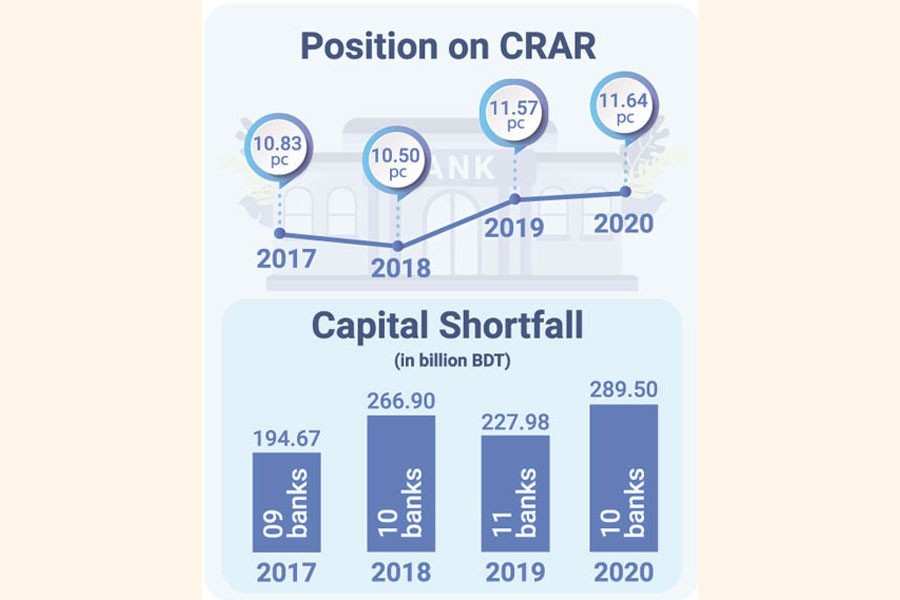The capital base of the country's banks improved marginally in 2020 mainly due to the 'decline' in the volume of their non-performing loans (NPLs), officials said.
The capital-to-risk weighted-asset ratio (CRAR) of all the scheduled banks rose to 11.64 per cent as on December 31 last year from 11.57 per cent on the same day of the year before, according to the latest statistics of the Bangladesh Bank (BB).
"The bank's capital base rose in the outgoing calendar year due to the fall in default loans significantly in 2020," a BB senior official told the FE on Monday while explaining the latest situation on CRAR in the banking system.
The NPLs shrank by more than 6.0 per cent or Tk 60.49 billion to Tk 882.82 billion, excluding offshore banking operations, as of December 31 from Tk 943.31 billion a year ago.
The suspension of the usual practice of classifying loans that had been put into effect by the BB in March 2020 following the outbreak of Covid-19 had been largely responsible for the shrinking of the classified loans in the country's banking sector.
However, 10 banks out of the total 59 witnessed a total capital shortfall of Tk 289.50 billion in 2020 despite a falling trend in default loans.
The 10 banks-five state-owned commercial banks (SoCBs), three private commercial banks (PCBs) and two specialised banks (SBs) -were put on the list of banks that suffered the capital shortfall, according to the BB officials.
"The quality of assets of these banks is poor and those could not generate enough profits to increase their capital bases," another BB said while explaining the capital shortages of the banks.
Most of these banks are chronic defaulters as far as the maintenance of CRAR, according to the central banker.
Meanwhile, the total regulatory capital increased by 8.83 per cent or Tk 106.99 billion to Tk 1,318.34 billion in the final quarter of 2020 from Tk 1,211.34 billion a year before.
The central banker also said the capital shortfall of the banks may improve in April this year if the central bank offers regulatory forbearance to some banks considering the overall economic situation.
In 2019, eleven banks suffered a total capital shortfall of Tk 227.98 billion as the growing classified loans wiped off their profits.
The 11banks-five SoCBs, three PCBs, a foreign commercial bank (FCB) and two SBs-were put on the list of capital-deficient ones.
The CRAR of PCBs was found, on average, 13.96 per cent as on December 31 last while the CRAR of nine foreign commercial banks stood at 28.24 per cent.
However, the capital position of public banks is still a matter of concern, the BB official noted.
The CRAR of six SoCBs stood at 4.34 per cent as on December 31 last calendar year while the CRAR of two SBs was in the negative territory at 32.92 per cent, the BB data showed.
Talking to the FE, Syed Mahbubur Rahman, former chairman of Association of Bankers, Bangladesh (ABB), said the banks might enhance their capital base through improving their assets quality.
"Otherwise, fresh capital will have be injected to improve the capital base of the banks particularly public ones," explained Mr Rahman, also managing director (MD) and chief executive officer (CEO) of Mutual Trust Bank Limited.


